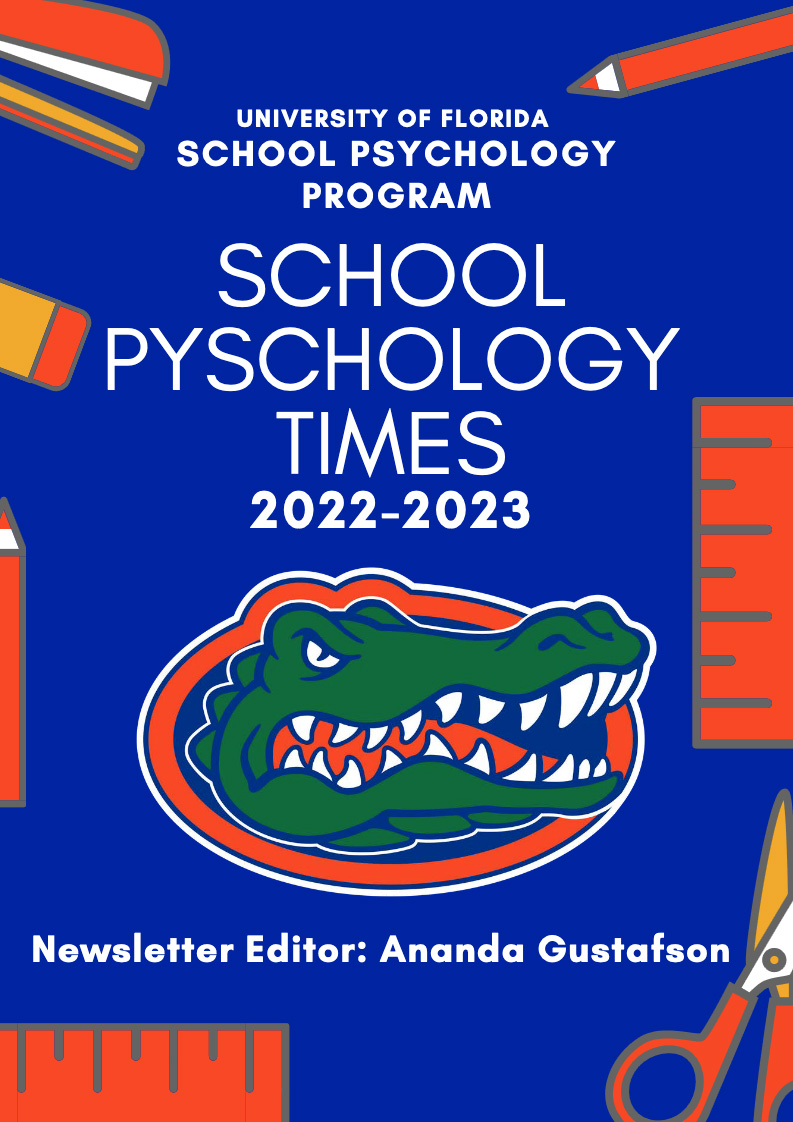|
Education Specialist (EdS)
|
Doctor of Philosophy (PhD)
|
|
Handbooks
|
Education Specialist (EdS) Handbook
Last updated: 2023-2024
|
Doctor of Philosophy (PhD) Handbook
Last updated: 2023-2024
|
|
|
First and second year students, regardless of their degree track, are assigned to a practicum placement with a practicing school psychologist in Gainesville and neighboring counties. Students will accrue a minimum of 300 hours in practicum and related activities per year. Read more […]
|
|
|
All students in the School Psychology Program (SPP) culminate their graduate training in a professional internship. SPP students have completed internships in a variety of settings across the United States. Read more […]
|
|
|
Because the SPP is a full-time program, many students are in need of financial support. There are three main sources of financial support for SPP students: scholarships, assistantships (research and teaching), and related work on and off campus. Read more […]
|
|
|
|
The School Psychology Graduate Student Association (SPGSA) is a student-run organization designed to represent and serve the interests of graduate students in the school psychology program. All students in the School Psychology Program are encouraged to join the organization. Read more […]
|
|
|
|
The School Psychology Times is the newsletter of the SPP at the University of Florida. It’s published electronically once a year by the School Psychology Test Librarian. Read the latest issue here! […]
|
|
|
|
Additional Resources can be found here […]
|
|
First- and Second-Year Practicum
The School Psychology Program (SPP) at the University of Florida offers a wide variety of practicum opportunities. During practicum placements, school psychology students gain practicum experiences related not only to their course requirements, but also to the expertise of their supervisor and unique characteristics of the placement setting. Opportunities are available to develop expertise in diverse areas, such as RtI implementation, early childhood, low incidence disabilities, bilingual school psychology, behavior disorders, pediatric psychology, forensic psychology, post-secondary education, and across the K-12 education spectrum.
During the first year, students develop skills in conducting Functional Behavioral Assessment (FBA), as well as assessment and intervention for students with academic difficulties. These requirements are met through course assignments to be completed at the practicum placement setting. Typically, students spend 8 – 10 hours a week working in the practicum setting with the guidance of a supervising school psychologist. This allows students a depth of experience beyond course requirements alone.
Second year students are again assigned a practicum placement in a public school setting, with consideration given to students’ developing specialization interests. Second year practicum emphasizes skill development in intelligence/cognitive evaluation, social/emotional assessment, counseling, school consultation, and the execution of comprehensive psychoeducational evaluations. Students also work with their supervising school psychologists to further develop their expertise in providing psychological services to children in the school setting. For example, second year students often involve themselves in additional activities providing counseling, consultation, and assessment services.
Advanced Practicum
Students pursuing a Ph.D. degree participate in advanced practicum activities under the supervision of a psychologist for one or more additional years. Advanced practicum placements are decided in collaboration with the student, his/her advisor and the practica coordinator to facilitate developing specialized professional interests. These practicum settings range from intensive school-based placements to clinical settings. A list of recent students’ advanced practicum settings is provided below.
Response-to-Intervention (RTI)
As the State of Florida has implemented the Response-to-Intervention (RtI) model for delivering prevention and intervention services, practica in the schools will afford multiple opportunities to observe RtI applications in classroom settings. Consistent with the program cognitive-behavioral approach, the advanced clinical sites emphasize behavioral modification techniques and cognitive-behavioral therapy strategies
Internships are the culmination of a student’s professional training
A successful internship is an interactive, dynamic experience in which the intern applies knowledge and skills gleaned from coursework to real settings. These include problem identification, hypothesis generation, intervention, and the determination of outcomes.
Ed.S.
Ed.S. students typically complete their internship requirements at a minimum of 1200 hours, in the third year of the training program.
Ed.S. Internship Locations
- Alachua County Schools, Florida
- Birmingham Public Schools, Michigan
- Bradford County Schools, Florida
- Broward County Schools, Florida
- Clark County Schools, Georgia
- Clay County Schools, Florida
- Citrus County Public Schools, Florida
- Duval County Public Schools, Florida
- Fairfax County Schools, Virginia
- Fulton County Schools, Georgia
- Gwinnett County Schools, Georgia
- Hillsborough County Schools, Florida
- Indian River County Schools, Florida
- Naperville School District, Illinois
- Pasco County Schools, Florida
- Pinellas County Public Schools, Florida
- Prince William County Public Schools, Virginia
- Sarasota County Schools, Florida
- School District 45-DuPage County, Illinois
- Volusia County Schools, Florida
Ph.D.
Ph.D. students are eligible for their internship after completing advanced coursework and practicum requirements. They are required to complete a minimum of 1500 hours.
Ph.D. Internship Locations
- Alachua County Schools, Florida
- Bellows Spring Elementary School, Maryland
- *Cherokee Health Systems, Tennessee
- *Children’s Assessment Center, Texas
- *Cypress/Fairbanks Independent School District, Texas
- *Family Service and Guidance Center, Kansas
- Indian River County Schools, Florida
- *The Marcus Institute, Georgia
- Munroe-Meyer Institute, Nebraska
- Multidisciplinary Diagnostic and Treatment Program, Florida
- Pinellas County Schools, Florida
- P. K. Yonge Developmental Research School, Florida
- Prince George’s County Schools, Maryland
- *River Bend Community Health, Inc., New Hampshire
- Round Rock Independent Schools, Texas
- *Sarah Reed Children’s Center, Pennsylvania
- Shands Vista Behavioral Health Center, Florida
- Somerset Hills School District, New Jersey
- St. Lucie County Schools, Florida
- Syracuse City Public Schools, New York
- *The Children’s Hospital of Michigan, Michigan
- *The Menta Group, Illinois
- *The Yale Child Study Center, Connecticut
- *University of Southern California Children’s Hospital, California
- *USC Children’s Hospital, California
- *Virginia Beach City Public Schools, Virginia
* Indicates APPIC internship site. More information about APPIC internships is available at http://www.appic.org/
Graduate School Fellows represent the highest graduate student award available at the University. Funded at nationally competitive levels, these highly prestigious awards support students in all programs and departments of the University awarding a PhD. The first class of the “Alumni 100” Graduate Fellows began in the fall of 1999. The University has steadily increased the number of fellowships available each year. The Alumni Graduate Fellowships focus on identifying and supporting students who seek the Ph.D. degree or selected terminal master’s degrees (e.g., the MFA). To ensure that Alumni Fellows receive every opportunity to succeed, the Alumni Graduate Fellowships provide a full four years of support for qualifying students.
The intent of the Grinter Fellowship is to facilitate the recruitment of truly exceptional graduate students to the University of Florida. Currently enrolled UF graduate students are not eligible, except in the particular case in which they will be entering a Ph.D. program for the first time. Grinter Fellowships are not assistantships. No duties may be required of the student (except those duties associated with an assistantship held concurrently). Grinter Fellowship stipends are normally in the $2,000-$4,000 range.
This Fellowship is available for students from underrepresented groups enrolled in doctoral programs.
Doctoral students with excellent academic records generally are considered first for these positions. Most assistantships are available for serving as instructors for undergraduate classes within the College of Education. SPP students compete with other graduate students in the College for departmental assistantships. In order to be eligible for teaching assistantships, SPP students must have already taken a course (or courses) in the subject area for which they will serve as a teaching assistant. This can be accomplished within the first or second years in the program. SPP students can increase their chances for being selected for teaching assistantships if they display exemplary work in these courses.
Research assistantships are available to students from a number of sources. Individual faculty members often receive grant monies that can support a research assistant. Individual faculty with grants often approach students who demonstrate a consistent record of solid academic performance, dependability, and a strong work ethic. These assistantships frequently support students for more than 1 year. In addition to an hourly wage, tuition waivers for in-state matriculation fees accompany many assistantships. Non-Florida Tuition Waivers are available to eligible out-of-state students with assistantships. For more information on these sources of financial assistance, contact the Office of Student Services (G416 Norman Hall) or the chair of the Department.
School Psychology Graduate Student Association
There are six elected SPGSA officers who organize and host events and represent students in program faculty meetings. SPGSA hosts a number of activities and events, such as special topic presentations related to school psychology by faculty members from other academic fields, student social activities, and School Psychology Awareness Week. Additionally, the organization encourages participation in community outreach activities. The current year’s officers are:
Alexa Dixon
Co-President
Ph.D. Program
Elon University
Hometown: Dillsburg, PA |
David Riddle
Co-President
Ph.D. Program
University of South Carolina
Hometown: Columbia, SC |
Ryan Walker-Snellings
Treasurer
Ph.D. Program
University of Central Florida
Hometown: Fort Lauderdale, FL |
Catherine Rama
Secretary
Ph.D. Program
University of Florida
Hometown: Orlando, FL |
Monique Cohn
Social Chair
Ph.D. Program
University of Central Florida
Hometown: Myrtle Beach, SC |
Kathryn Trainor
Professional Organization Liaison
Ph.D. Program
University of North Carolina-Chapel Hill
Hometown: Charlotte, NC |
Chris Robert
Public Relations Chair
Ph.D. Program
University of Missouri-Columbia
Hometown: McKinney, TX |
Joseph Graham
First-Year Liaison
Ph.D. Program
University of Arizona
Hometown:
Tucson, AZ |
The School Psychology Times of the University of Florida
The purpose of the Times is to provide support to the missions of the SPP by enhancing communications. It achieves this by the following.
- Highlights the activities and accomplishments
- Announces parties and other important events
- Enables individual members to express themselves.
This newsletter is published electronically once a year by the School Psychology Test Librarian. You can read the archive issues here.






